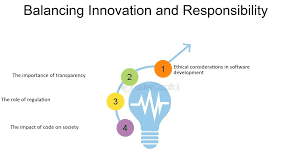Game Development Ethics: Balancing Innovation with Responsible Data Management
Introduction In the dynamic landscape of game development, ethical considerations are paramount. As technology advances and data-driven approaches become increasingly prevalent, developers face the challenge of balancing innovation with responsible data management. This note delves into the ethical dimensions of game development, emphasizing the importance of upholding principles of privacy, consent, and transparency while pursuing creative endeavors.
- Ethical
Principles in Game Development
- Privacy: Game developers must respect players' privacy rights by collecting only necessary data, securing it appropriately, and using it responsibly.
- Consent: Transparent communication and obtaining informed consent are essential when collecting and processing player data for analytics or personalized experiences.
- Fairness: Games should be designed to provide fair and equitable experiences for all players, free from bias, discrimination, or exploitative practices.
- Accountability: Developers should take responsibility for the ethical implications of their creations, including addressing issues such as addiction, toxicity, and harmful content.
- Transparency: Openness and honesty about data practices, monetization strategies, and potential risks ensure that players can make informed choices.
- Challenges
in Responsible Data Management
- Data Collection: Balancing the need for data-driven insights with respect for player privacy requires careful consideration of what data to collect and how to anonymize and protect it.
- Data Security: Safeguarding player data against breaches, hacking attempts, and unauthorized access is crucial to maintaining trust and integrity in gaming ecosystems.
- Data Monetization: Ethical concerns arise when data is monetized through targeted advertising, microtransactions, or selling player information to third parties, necessitating transparency and consent mechanisms.
- Behavioral Tracking: Monitoring player behavior for analytics purposes must be conducted ethically, ensuring that data collection methods are transparent and respectful of individual privacy.
- Best
Practices for Ethical Game Development
- Privacy by Design: Incorporating privacy considerations into the design and development process ensures that data protection measures are integrated from the outset.
- User Empowerment: Providing players with control over their data through privacy settings, opt-out options, and clear data management tools enhances trust and transparency.
- Ethical Guidelines: Adopting industry-wide standards and guidelines for ethical game development promotes responsible practices and accountability within the gaming community.
- Community Engagement: Soliciting feedback from players and stakeholders fosters dialogue around ethical concerns, enabling developers to address issues collaboratively.
Conclusion Ethical game development requires a delicate balance between innovation and responsible data management. By upholding principles of privacy, consent, fairness, and transparency, developers can create immersive gaming experiences that prioritize player well-being and integrity. Embracing ethical guidelines and fostering open dialogue within the gaming community are essential steps toward building a sustainable and ethical future for game development.



Comments
Post a Comment